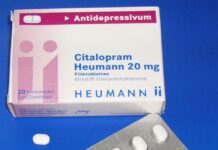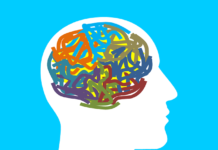Psychotherapy Can Prevent Relapse When Discontinuing Antidepressants
“Short and simple psychological programs can prevent people from relapsing when they stop their antidepressants.”
Could ‘Treatment Resistance’ be an Effect of Antidepressants?
Previously taking antidepressants could make individuals less likely to respond to treatment for bipolar II depression.
Most Off-Label Prescribing of Antidepressants Lacks Strong Scientific Evidence
A new study, published in the British Medical Journal, investigates the prevalence of off-label prescribing for antidepressant medication in primary care settings.
Brain Response to Antidepressant Mirrors Placebo Effect
People diagnosed with severe depression show the same changes in brain scans when they respond to a placebo as they do when they take an actual antidepressant, according to a new study. Researchers also found that those whose symptoms were decreased by a placebo were more likely to report relief from antidepressant drugs.
Withdrawal Symptoms Cloud Findings of Antidepressant “Relapse” Trial
Leading researchers point out that a new antidepressant study in NEJM failed to account for withdrawal symptoms, casting doubt on the results.
Increased Suicidality in Cymbalta Trial for Fibromyalgia in Teens
A new as-yet-unpublished trial of duloxetine (Cymbalta) for fibromyalgia has presented more evidence of suicidal events in teens.
Is There a Small Group for Whom Antidepressants Are Effective?
In a new study, researchers found no evidence of antidepressant group variance, which means that there's no particular group of patients who improve more than others on the drug.
Antidepressant use During Pregnancy may Increase Risk of Birth Defects
Use of antidepressants increased the risk of organ-specific malformations in women with depression
Antidepressants No Better Than Placebo for About 85% of People
Researchers can’t predict the 15% who benefit from antidepressants, and the other 85% are unnecessarily exposed to the harms of the drugs.
Anticholinergic Drugs, Including Antidepressants, Linked To Later Cognitive Problems
A new study, published in JAMA Neurology, found that older people who regularly took anticholinergic drugs, including certain cold medicines or antidepressants, had poorer...
Antidepressants Linked to Increased Risk of Preeclampsia in Pregnancy
Pregnant women taking antidepressant medications, especially during the second trimester, have an increased risk of preeclampsia, a potentially serious or even fatal condition.
Interview: Researchers Deconstruct Ghostwritten Industry Trial for Antidepressant
Researchers, Jon Jureidini, Jay Amsterdam and Leemon McHenry, have taken a closer look at the data from a randomized control trial of citalopram (Celexa) that was ghostwritten and then used by the manufacturers to support claims of the drug’s efficacy and safety in the treatment of child and adolescent depression. To get the background on this story, we connected with Dr. Leemon McHenry, an investigator in this study and a lecturer in philosophy at California State University, Northridge.
11% of U.S. on Antidepressants: Less than 1/2 See a Mental Health Professional
Data from the National Health and Nutrition Examination Surveys (2005-2008) show that 11% of Americans 12 and over take antidepressants. 60% of those have...
PTSD and Psychiatric Medication Linked to Dementia in Older Veterans
Veterans diagnosed with PTSD and taking SSRIs, novel antidepressants, or atypical antipsychotics are more likely to develop dementia.
Risk of Bone Fractures With SSRIs Greater Than Thought
Researchers from McMaster University's Department of Medicine, presenting at this year's American Society for Bone and Mineral Research's annual meeting, found that the magnitude...
Some Common Psychiatric Medications Associated With Pneumonia
Pneumonia cases in the elderly are strongly associated with use of anticholinergic medications, including benzodiazepines and tricyclic antidepressants.
No Matter Which Measure You Use, Antidepressants Aren’t That Effective
Researchers compared the efficacy of antidepressants using different rating scales and found them to be no different—just slightly better than placebo, and not meeting the criteria for clinical significance.
Antidepressants Blunt Ability to Feel Empathy
A new study suggests that taking antidepressants impairs empathy, while the experience of depression itself does not.
Suicide Attempts Similar With Various Antidepressants for Children
Researchers from Vanderbilt University and the University of Alabama found, in a retrospective study of increased suicidal behavior among 36,842 children who were new...
No Good Evidence That Antidepressants Prevent Relapse
Trials of antidepressants for relapse prevention are confounded by withdrawal effects caused by the drugs.
Children Taking ADHD Drugs More Likely to Take Antidepressants as Teens
Adhering to a commonly prescribed medication for ADHD in children is associated with higher chances of being prescribed antidepressants in adolescence.
Quality of Relationship to Doctor Significantly Improves Antidepressant Efficacy
The more that patients feel that they have a high-quality relationship with their prescribing physician, the more likely that they will regard their own responses to antidepressants as positive.
SSRIs Impair Learning From Negative Feedback
A study comparing the effects on cognition of major depression (MDD) vs. SSRIs finds that healthy subjects learn significantly better from positive feedback than...
Further Results Confirm Antidepressants Increase Risk of Violent Crime By 26%
Taking an SSRI antidepressant was associated with a 26% increased risk of violent crime conviction.
Prescribers Often Fail to Support Patients Discontinuing Antidepressants, Study Finds
Study reveals most patients are dissatisfied with prescribers' support when discontinuing antidepressants.

























